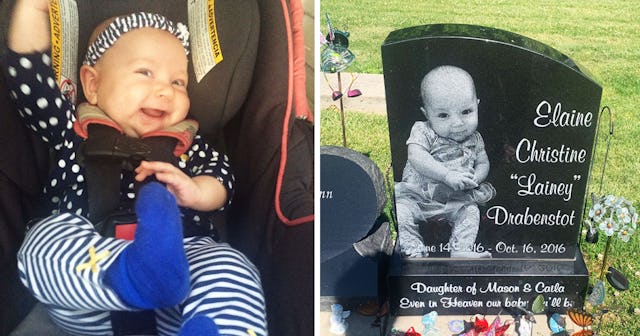On Pregnancy And Infant Loss Awareness Day, Can We Be Equals?

Trigger warning: pregnancy and infant loss
This year was the fifth year that I’ve missed out on an annual Pregnancy and Infant Loss Awareness Day walk near my hometown. I actually “attended” two years in a row following my daughter’s death, but I ended up leaving after fifteen minutes. So, I don’t think that counts since there was no walking, releasing of balloons, or mingling.
My daughter died the day after Pregnancy And Infant Loss Awareness Day, so these walks typically fall on the week of her death date. And if I’m honest, that time of the year is exceptionally difficult for me. Pair it with a rather sizable, annual event filled with other grieving mothers, and it’s too much for me to handle emotionally.
I’ve never been good at making solid friendships with other bereaved mothers throughout my years of grieving, either, even though I long for that companionship. Most of the grieving parents I’ve met (but not all) seem to pair themselves together with others who have had similar losses to them — late miscarriage, early miscarriage, stillbirth, loss of an older child, etc. And I get that. I really do. But sometimes, I wish there was more space for parents who don’t have the most “typical” losses too.
Courtesy of Caila Smith
I talk a lot about the loss of my daughter, but what you don’t hear as frequently is that I had a miscarriage before anyone saw me as a mother. For months, I wept into my pillow every night. They were the deep, ugly sobs—the ones you have to feel to know. And if you know, then there’s nothing more to say about it other than I’m sorry you’ve been there too. I was angry with every pregnancy announcement that I saw, seriously depressed, and to top it all off, I was very young. When you’re young and have a miscarriage, people are quick to look to the “bright side”. The only thing is, it didn’t feel like there was one.
With my miscarriage came limited support. I don’t think I even heard of Pregnancy And Infant Loss Awareness Day — that is how out of the loop I was. It felt like I wasn’t far enough along for a warm welcome from the “miscarriage group” of grieving moms, almost like my grief was inferior to another’s because I never saw a heartbeat on the ultrasound. But now that I’ve lost a child I birthed and held, it feels like other mothers who lost their children in the womb feel the same way about their earlier gestational losses as I did too.
They begin conversations off about their grief with phrases like “I know you had it much worse” or “I shouldn’t complain about this to you.” But each time they say these things to me, it breaks my heart for them. Because I’ve been there, and I wish they knew that our grief isn’t a competition and I’m not keeping score.
Courtesy of Caila Smith
If I’m honest, I can’t say that my miscarriage was just as difficult for me as the loss of my daughter. I’ve gathered this opinion from my own lived experiences, and it’s only a reflection of my own life. In acknowledging that, in no way does it mean that I place a lesser value on the grief process that comes from an earlier loss. Because when I was nineteen and the only experience I had with child loss was a miscarriage, the loss of that baby destroyed me too.
I lost two children in very different ways, and when someone is vulnerably expressing their pain to me from their own experiences, I’m not thinking of all the ways they lucked out of something “more” horrific. The loss of a child, no matter the circumstances, is always devastating to parents. We need support, but most importantly, we need to support each other — every day, but especially on Pregnancy And Infant Loss Awareness Day.
The thing that is supposed to bind us together has somehow torn us apart because so many of us are fixated on how we had it better or worse. We’ve become so focused on placing grief into boxes organized by how “worthy” and impactful we deem someone’s loss, and judgments such as these increase feelings of shame, guilt, and isolation.
Courtesy of Caila Smith
Sometimes I wish that parents could tell people they lost a child and that be the end of it. I wish there were no more questions asking them to clarify or quantify their loss. No more “I thought you meant a real child” glares and no more telling people to look on the bright side. On Pregnancy And Infant Loss Awareness Day, I wish bereaved parents could look at each other as equals.
We shouldn’t need someone to diminish their grief to feel validated about our own. Instead, we should view our losses as separate because that’s what they are. Furthermore, when someone is sharing a sacred piece of their grieving process, it isn’t about us or our grief — it’s about them and theirs.
We need to remember that all bereaved parents are welcome to share their stories.
Courtesy of Caila Smith